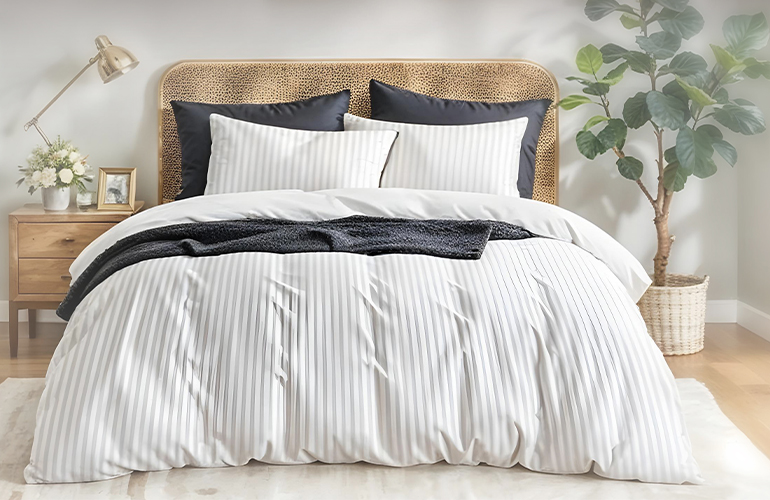Benefits of Organic and Natural Bedding Materials
- home
- Blog
- November 02, 2024

Benefits of Organic and Natural Bedding Materials
In a world increasingly focused on health, wellness, and sustainability, the bedding industry has experienced a surge in demand for organic and natural options. People want to sleep in a space that supports health and is gentle on the planet. Organic bedding materials bring together comfort, quality, and ecological responsibility, offering a better choice for anyone looking to improve their sleep environment.
What Are Organic and Natural Bedding Materials?
Organic bedding is made from materials grown without harmful chemicals, pesticides, or synthetic additives. The most popular choices include organic cotton, wool, bamboo, and hemp, each providing unique benefits and a more natural alternative to conventional, synthetic fabrics.
Why Choose Organic and Natural Bedding?
Choosing organic bedding isn’t just about luxury; it’s about well-being. Conventional bedding can contain chemical residues from manufacturing that can affect health, particularly for people with sensitivities or allergies. Organic bedding offers a chemical-free, toxin-free alternative that’s better for both you and the environment.
Top Benefits of Organic Bedding
1. Better Sleep Quality: Natural fibers in organic bedding allow for better airflow and moisture-wicking, keeping you cool in the summer and warm in the winter. This adaptability promotes better, uninterrupted sleep.
2. Allergy and Asthma Friendly: Organic bedding lacks the harsh chemicals and synthetic fibers that can trigger allergies and asthma. Natural materials are less likely to trap dust mites, pet dander, or other allergens, helping you breathe easier at night.
3. Chemical-Free and Non-Toxic: Traditional bedding often undergoes chemical treatments that may release harmful gases over time. Organic bedding, however, is made without toxins, so you can rest easy knowing your sleep environment is healthier and cleaner.
4. Hypoallergenic Properties: Materials like organic cotton and wool naturally resist mold and mildew, making them ideal for people with allergies. Wool, in particular, is naturally resistant to dust mites, which are a common allergen.
Types of Organic Bedding Materials
Organic Cotton: One of the most popular choices, organic cotton is breathable, soft, and versatile, perfect for sheets, pillowcases, and blankets.
Organic Wool: Wool is an excellent choice for blankets and comforters because of its insulating properties. It’s also naturally flame-resistant and hypoallergenic.
Hemp: Hemp bedding is durable, biodegradable, and eco-friendly. It’s a great option for people looking for a robust material that softens with each wash.
Impact on the Environment
Organic bedding is sustainable, reducing our carbon footprint and using renewable, biodegradable resources. By choosing natural materials, you’re supporting an eco-friendly industry that’s kinder to the planet and its resources.

Comfort and Softness
Natural fibers tend to be softer and more breathable, which enhances comfort. Many find that organic bedding feels better against their skin, offering a luxurious experience without the environmental cost.
Durability and Longevity
Organic bedding materials, particularly cotton and hemp, are known for their durability. They can last longer than synthetic materials because they’re less likely to degrade over time, making them a cost-effective choice.
Conclusion
Choosing organic bedding is a step towards a healthier lifestyle, a cleaner planet, and a better night’s sleep. With benefits ranging from enhanced comfort to reduced allergens, switching to organic bedding is an investment in your well-being and the environment.
FAQs
1. What makes bedding “organic”?
Organic bedding is made from natural materials without chemicals, pesticides, or synthetic treatments.
2. Is organic bedding hypoallergenic?
Yes, organic bedding is typically hypoallergenic, as it avoids allergens and resists dust mites.
3. Is it difficult to care for organic bedding?
No, organic bedding is easy to maintain with regular, gentle washing and careful storage.


Drop us a line